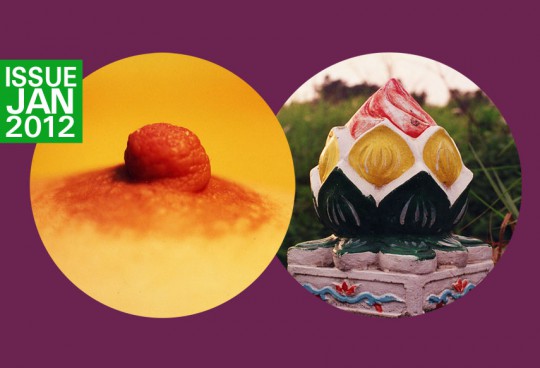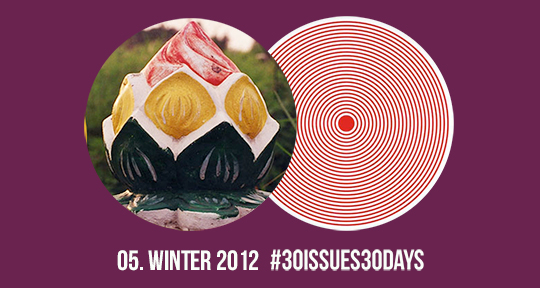“When I’m having trouble writing something, I often close the document and compose the passage as email. I imagine I can feel the tug at the other end of the wire, and this creates in me a needed urgency. The letter always arrives at its destination.”
—David Shields, excerpted in our Winter 2012 issue
Dear indignant scholar concerned that Taiwanese literature is always overlooked in favor of Mainland Chinese authors (e.g. when Mo Yan took the Nobel Prize for Literature in 2012),
This issue, spotlighting Taiwanese Fiction, is for you. Six months in its making, it is a showcase of contemporary Taiwanese art and letters sans pareil. In addition to fiction, there is nonfiction by Jing Xianghai that I rolled up my sleeves to translate five days before the issue launch. There is Antonio Chen’s roundup of Taiwanese novels in 2011 (for which I had to painstakingly format and upload image files for 26 book covers). There is even a fabulous piece of noise art accompanying poetry by Hsia Yü, the most acclaimed Taiwanese poet of her generation. Famously reclusive, Hsia Yü had only ever agreed to two interviews in a career that spanned thirty years, and we would go on to publish her third interview, conducted in Chinese and translated into English, in our Spring 2012 issue.
Leveraging a connection (I don’t have many of these, being somewhat of a recluse myself), I enlisted Legend Hou Chunming, the only living Taiwanese artist who commands six figures at Sotheby’s, to be our guest artist for this issue (it’s thanks to him we have a giant nipple on our cover!). After receiving the first batch of texts to illustrate, though, Hou tried to bow out, saying he was not used to subordinating his artistic impulse to the written word. When his email demurral popped up on my phone, I worried that history would repeat itself: our guest artist for the Summer 2011 issue had dropped out just three weeks before launch. From a park bench in front of Beitou library, I called Hou and, using my imperfect Singapore-accented Mandarin, persuaded him to stay on.
I also called Chu T’ien-wen to get her permission to publish an excerpt of Witch’s Brew. Long an admirer of her stunningly erudite Notes of a Desolate Man, I was more nervous about making this call, as it involved an exposition about Asymptote, its place in the Anglophone world, and my aspirations for the Taiwanese Fiction Feature. A woman picked up at the other end (Chu’s mother?), and it was not until I identified myself as a Singaporean editor liaising on behalf of Howard Goldblatt that she was willing to pass the phone to Chu T’ien-wen.
 Excerpting a new Chu T’ien-wen novel in English translation was nothing short of a coup (for which I have to thank pioneering translators Howard Goldblatt and Sylvia Lin, who also offered generous advice). But it was Wu He who proved to be the eye-opener, because despite being one of Taiwan’s most important writers, his work has rarely been translated into English. Terrence Russell explains in his translator’s note: “Though not following the path of social realism pioneered by Taiwanese ‘nativist’ writers of the 1970’s, Wu He is strongly committed to documenting the social and cultural history of his native place. To this end, he is almost obsessively concerned with the detail and colouring of the Taiwanese experience.”
Excerpting a new Chu T’ien-wen novel in English translation was nothing short of a coup (for which I have to thank pioneering translators Howard Goldblatt and Sylvia Lin, who also offered generous advice). But it was Wu He who proved to be the eye-opener, because despite being one of Taiwan’s most important writers, his work has rarely been translated into English. Terrence Russell explains in his translator’s note: “Though not following the path of social realism pioneered by Taiwanese ‘nativist’ writers of the 1970’s, Wu He is strongly committed to documenting the social and cultural history of his native place. To this end, he is almost obsessively concerned with the detail and colouring of the Taiwanese experience.”
As a Singaporean editor who had just moved to Taipei in July 2011, six months before the Winter 2012 issue launch, what could I know of this uniquely multifaceted “Taiwanese experience”? I hadn’t lived through the Japanese colonial era as a geitan, the Taiwanese version of a geisha. I had never been questioned about my father’s Communist affiliations during White Terror nor had I experienced the “explosive release of primitive energy” when martial law lifted in 1987. I hadn’t lived among an aboriginal tribe in the mountains, consulted a fengshui master or gone urn-shopping for my mother’s reinternment. I hadn’t hobnobbed among Taiwanese high society and felt so much social anxiety that I joined a Phantom of the Opera tour in Hong Kong. Nor, at the opposite end of the class spectrum, had I ever been suspected of being an illegal immigrant and shot by a traffic cop.
But there is still much an outsider with determination (and dedicated team members behind him) can do. Six months’ worth of research and networking (which even brought me to the National Museum of Taiwanese Literature in Southern Taiwan) culminated in this mammoth issue demonstrating the range and wealth that Taiwanese literature has to offer to the world.
Imagine what we could do for Taiwanese literature if your Ministry of Culture* gave Asymptote some funding.
Love,
Lee Yew Leong
Editor-in-Chief, Asymptote
*In the exact words of prominent Taiwanese literary agent Gray Tan: “You don’t approach the Ministry of Culture, the Ministry of Culture approaches you.”
*****
Read more from our #30issues30days showcase:

